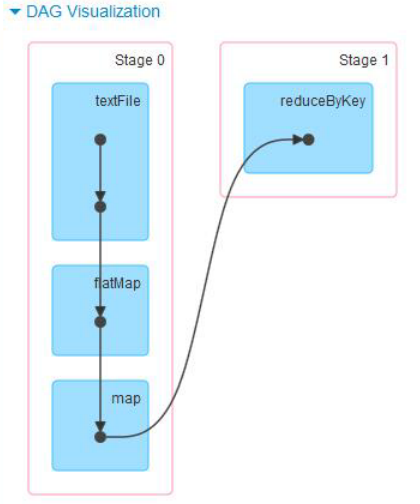withScope是最近的发现版中新增加的一个模块,它是用来做DAG可视化的(DAG visualization on SparkUI)
以前的sparkUI中只有stage的执行情况,也就是说我们不可以看到上个RDD到下个RDD的具体信息。于是为了在
sparkUI中能展示更多的信息。所以把所有创建的RDD的方法都包裹起来,同时用RDDOperationScope 记录 RDD 的操作历史和关联,就能达成目标。下面就是一张WordCount的DAG visualization on SparkUI

记录关系的RDDOperationScope源码如下:
/** * A general, named code block representing an operation that instantiates RDDs. * * All RDDs instantiated in the corresponding code block will store a pointer to this object. * Examples include, but will not be limited to, existing RDD operations, such as textFile, * reduceByKey, and treeAggregate. * * An operation scope may be nested in other scopes. For instance, a SQL query may enclose * scopes associated with the public RDD APIs it uses under the hood. * * There is no particular relationship between an operation scope and a stage or a job. * A scope may live inside one stage (e.g. map) or span across multiple jobs (e.g. take). */ @JsonInclude(Include.NON_NULL) @JsonPropertyOrder(Array("id", "name", "parent")) private[spark] class RDDOperationScope( val name: String, val parent: Option[RDDOperationScope] = None, val id: String = RDDOperationScope.nextScopeId().toString) { def toJson: String = { RDDOperationScope.jsonMapper.writeValueAsString(this) } /** * Return a list of scopes that this scope is a part of, including this scope itself. * The result is ordered from the outermost scope (eldest ancestor) to this scope. */ @JsonIgnore def getAllScopes: Seq[RDDOperationScope] = { parent.map(_.getAllScopes).getOrElse(Seq.empty) ++ Seq(this) } override def equals(other: Any): Boolean = { other match { case s: RDDOperationScope => id == s.id && name == s.name && parent == s.parent case _ => false } } override def hashCode(): Int = Objects.hashCode(id, name, parent) override def toString: String = toJson } /** * A collection of utility methods to construct a hierarchical representation of RDD scopes. * An RDD scope tracks the series of operations that created a given RDD. */ private[spark] object RDDOperationScope extends Logging { private val jsonMapper = new ObjectMapper().registerModule(DefaultScalaModule) private val scopeCounter = new AtomicInteger(0) def fromJson(s: String): RDDOperationScope = { jsonMapper.readValue(s, classOf[RDDOperationScope]) } /** Return a globally unique operation scope ID. */ def nextScopeId(): Int = scopeCounter.getAndIncrement /** * Execute the given body such that all RDDs created in this body will have the same scope. * The name of the scope will be the first method name in the stack trace that is not the * same as this method's. * * Note: Return statements are NOT allowed in body. */ private[spark] def withScope[T]( sc: SparkContext, allowNesting: Boolean = false)(body: => T): T = { val ourMethodName = "withScope" val callerMethodName = Thread.currentThread.getStackTrace() .dropWhile(_.getMethodName != ourMethodName) .find(_.getMethodName != ourMethodName) .map(_.getMethodName) .getOrElse { // Log a warning just in case, but this should almost certainly never happen logWarning("No valid method name for this RDD operation scope!") "N/A" } withScope[T](sc, callerMethodName, allowNesting, ignoreParent = false)(body) } /** * Execute the given body such that all RDDs created in this body will have the same scope. * * If nesting is allowed, any subsequent calls to this method in the given body will instantiate * child scopes that are nested within our scope. Otherwise, these calls will take no effect. * * Additionally, the caller of this method may optionally ignore the configurations and scopes * set by the higher level caller. In this case, this method will ignore the parent caller's * intention to disallow nesting, and the new scope instantiated will not have a parent. This * is useful for scoping physical operations in Spark SQL, for instance. * * Note: Return statements are NOT allowed in body. */ private[spark] def withScope[T]( sc: SparkContext, name: String, allowNesting: Boolean, ignoreParent: Boolean)(body: => T): T = { // Save the old scope to restore it later val scopeKey = SparkContext.RDD_SCOPE_KEY val noOverrideKey = SparkContext.RDD_SCOPE_NO_OVERRIDE_KEY val oldScopeJson = sc.getLocalProperty(scopeKey) val oldScope = Option(oldScopeJson).map(RDDOperationScope.fromJson) val oldNoOverride = sc.getLocalProperty(noOverrideKey) try { if (ignoreParent) { // Ignore all parent settings and scopes and start afresh with our own root scope sc.setLocalProperty(scopeKey, new RDDOperationScope(name).toJson) } else if (sc.getLocalProperty(noOverrideKey) == null) { // Otherwise, set the scope only if the higher level caller allows us to do so sc.setLocalProperty(scopeKey, new RDDOperationScope(name, oldScope).toJson) } // Optionally disallow the child body to override our scope if (!allowNesting) { sc.setLocalProperty(noOverrideKey, "true") log.info("this is textFile1") log.info("this is textFile2" ) //println("this is textFile3") log.error("this is textFile4err") log.warn("this is textFile5WARN") log.debug("this is textFile6debug") } body } finally { // Remember to restore any state that was modified before exiting sc.setLocalProperty(scopeKey, oldScopeJson) sc.setLocalProperty(noOverrideKey, oldNoOverride) } } }